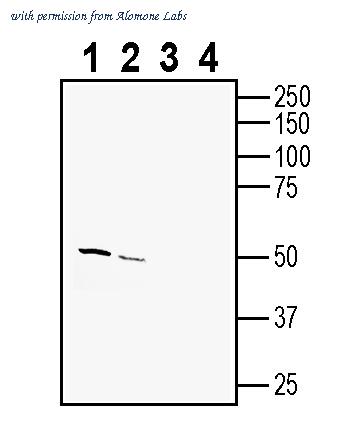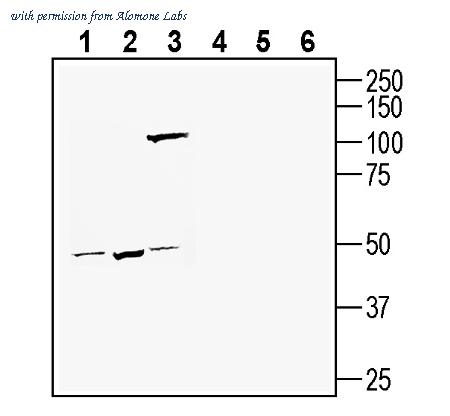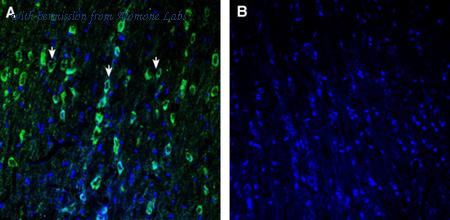product summary
Loading...
company name :
Alomone Labs
product type :
antibody
product name :
Anti-TMEM175 Antibody
catalog :
APC-175
clonality :
polyclonal
host :
domestic rabbit
conjugate :
nonconjugated
clone name :
NA
reactivity :
human, mouse, rat
application :
western blot, immunohistochemistry
more info or order :
image
image 1 :

Western blot analysis of rat spleen membranes (lanes 1 and 3) and mouse spleen lysates (lanes 2 and 4):
image 2 :

Western blot analysis of human SH-SY5Y neuroblastoma cell line lysate (lanes 1 and 4), human THP-1 monocytic leukemia cell line lysate (lanes 2 and 5) and human LNCaP prostate adenocarcinoma cell line lysate (lanes 3 and 6):
image 3 :

Expression of TMEM175 in rat medial septum.
product information
CAT :
APC-175
SKU :
APC-175-CF_0.2 ml
Product Name :
Anti-TMEM175 Antibody
Group Type :
Antibodies
Product Type :
Antibodies
Clonality :
Polyclonal
Accession :
Q9CXY1
Applications :
IHC WB
Reactivity :
Human Rat Mouse
Host :
Rabbit
Blocking Peptide :
BLP-PC175
Homology :
Rat - 13 out of 14 amino acid residues identical Human - 12 out of 14 amino acid residues identical
Formulation :
PBS pH7.4
isotype :
Rabbit IgG
Peptide confirmation :
Confirmed by amino acid analysis and mass spectrometry
Reconstitution :
0.2 ml double distilled water (DDW).
Antibody Concentration After Reconstitut ... :
1 mg/ml
Storage After Reconstitution :
The reconstituted solution can be stored at 4°C for up to 1 week. For longer periods, small aliquots should be stored at -20°C. Avoid multiple freezing and thawing. Centrifuge all antibody preparations before use (10000 x g 5 min).
Preservative :
No Preservative
Immunogen Location :
Luminal, 4th loop.
Label :
Unconjugated
Storage Before Reconstitution :
The antibody ships as a lyophilized powder at room temperature. Upon arrival, it should be stored at -20°C
Shipping and storage :
Shipped at room temperature. Product as supplied can be stored intact at room temperature for several weeks. For longer periods, it should be stored at -20°C
immunogen source species :
Mouse
Sequence :
CEDNVPDPKDVQEK, corresponding to amino acid residues 278 - 291 of mouse TMEM175
Product Page - Scientific background :
Transmembrane protein 175, TMEM175, is an endosomal/lysosomal proton channel that plays a crucial role in preserving the lysosomal membrane potential and maintaining pH stability. TMEM175 mediates lysosomal proton efflux, known as the "H+ leak" pathway, preventing excessive acidification of lysosomes.1 Intracellular endosomes and lysosomes rely on a vacuolar-type H+ ATPase (V-ATPase) to establish a significant proton concentration gradient across their membranes, which plays a crucial role in facilitating active transport of ions and metabolites between the vesicular lumen and the cytosol. To effectively digest macromolecules, lysosomes rely on an acidic environment with a pH range of 4.5 to 5.0, which is maintained through the entry of protons by the V-ATPase pump and their exit through the "H+ leak" pathway, which is the passive release of H+ into the cytosol. TMEM175 functions as a proton-activated, proton-selective channel on the lysosomal membrane in order to mediate the "H+ leak" pathway, prohibiting the excessive acidification of lysosomes. When lysosomes are acidified beyond the typical range, TMEM175 is activated, prohibiting further lysosomal acidification.1Mammalian TMEM175 consists of two homologous 6-TM domains and is suggested to function as a dimer. TM1 serves as the inner helix lining the pore and forms an hourglass-shaped ion permeation pathway within the channel. The C-terminal half of TM1 contains hydrophobic residues that create a bottleneck along the ion conduction pathway, serving as the selectivity filter of the channel. TMEM175 conducts K+ constitutively at pH 7.4, but shows reduced K+ permeation at lower pH. Conversely, proton current through TMEM175 increases with decreasing pH due to the increased proton gradient. Molecular dynamics simulation, structure-based mutagenesis, and electrophysiological analysis suggest that K+ ions and protons share the same permeation pathway in TMEM175.2,3Altered lysosomal pH disrupts various cellular processes, including lysosomal degradation, cargo loading, catabolite export, vesicle movement, and nutrient sensing. This impairment contributes to the pathogenesis of neurodegenerative diseases such as Parkinson's disease, Alzheimer's disease, and lysosomal storage diseases. Optimization of lysosomal pH can effectively clear toxic protein aggregates associated with these diseases. Thus, maintaining lysosomal pH homeostasis plays a crucial role in lysosome function, cellular health, and neuropathology.1
Applications may also work in :
IHC WB
Supplier :
Alomone Labs
Target :
Transmembrane Protein 175, Endosomal/Lysosomal Proton Channel TMEM175
Short Description :
A Rabbit Polyclonal antibody to TMEM175
Long Description :
Anti-TMEM175 Antibody (#APC-175) is a highly specific antibody directed against an epitope of the mouse protein. The antibody can be used in western blot and immunohistochemistry applications. It has been designed to recognize TMEM175 from rat, mouse and human samples.
Negative Control :
BLP-PC175
Positive Control :
NA
Synonyms :
Transmembrane Protein 175, Endosomal/Lysosomal Proton Channel TMEM175
Lead Time :
1-2 Business Days
Country of origin :
Israel/IL
Applications key :
CBE- Cell-based ELISA, FC- Flow cytometry, ICC- Immunocytochemistry, IE- Indirect ELISA, IF- Immunofluorescence, IFC- Indirect flow cytometry, IHC- Immunohistochemistry, IP- Immunoprecipitation, LCI- Live cell imaging, N- Neutralization, WB- Western blot
Specifictiy :
TMEM175
Form :
Lyophilized powder. Reconstituted antibody contains phosphate buffered saline (PBS), pH 7.4.
Comment :
Contact Alomone Labs for technical support and product customization
Species reactivity key :
H- Human, M- Mouse, R- Rat
Is Toxin :
No
Purity :
Affinity purified on immobilized antigen.
UNSPSC :
41116161
Clone :
NA
Standard quality control of each lot :
Western blot analysis
Antigen preadsorption control :
1 µg peptide per 1 µg antibody
Application Dilutions: Immunohistochemis ... :
1:300
Application Dilutions: Western blot wb :
1:200
more info or order :
company information

Alomone Labs
Jerusalem BioPark (JBP), Hadassah Ein Kerem
P.O. Box 4287
Jerusalem 9104201
P.O. Box 4287
Jerusalem 9104201
info@alomone.com
http://www.alomone.com972 2 531 8002
headquarters: Israel
related products
browse more products
- Anti-P2X7 Receptor (extracellular)-mFluor™ Violet 450 Antibody | APR-008-V
- Anti-P2Y12 Receptor (extracellular)-APC Antibody | APR-020-APC
- Anti-P2Y12 Receptor (extracellular)-mFluor™ Violet 450 Antibody | APR-020-V
- Anti-P2X1 Receptor (extracellular)-APC Antibody | APR-022-APC
- Anti-P2X4 Receptor (extracellular)-APC Antibody | APR-024-APC
questions and comments
